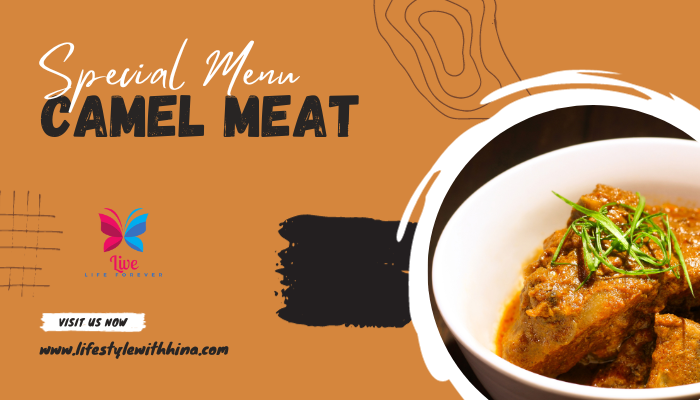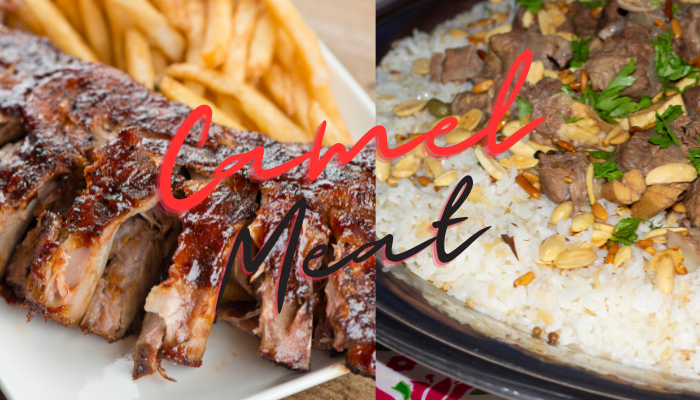Exploring the Culinary Delights of Camel Meat: A Unique Gastronomic Journey

Camel Meat

Introduction:
Camel meat, often referred to as the “ship of the desert,” has long been a staple food source for communities in arid regions across the globe. Known for its rich flavor, tender texture, and impressive nutritional profile, camel meat is gaining recognition as a unique and delicious culinary delight. In this article, we delve into the world of camel meat, exploring its taste, nutritional benefits, and cultural significance.
A Distinctive Flavor:
Embark on a culinary journey with camel meat, a true standout among the more familiar flavors of beef, pork, or chicken. Picture this: a delightful dance on your taste buds where the slightly gamey essence meets a subtle hint of sweetness, creating a palate experience like no other.
What makes camel meat truly special is the rich, earthy undertone that whispers of the vast desert landscapes where these majestic creatures roam. It’s more than just a meal; it’s a gastronomic adventure.
This distinctive flavor owes its magic to the camel’s unique diet, predominantly composed of desert vegetation, leaving a mark on every bite. Immerse yourself in the extraordinary, savoring not just a dish, but a tale of terroir and taste that elevates your culinary experience.
Camel meat boasts a flavor that sets it apart from more commonly consumed meats like beef, pork, or chicken. The taste can be described as slightly gamey, with a hint of sweetness and a rich, earthy undertone. The meat’s unique flavor is attributed to the camel’s diet, which primarily consists of desert vegetation, providing it with a distinctive taste profile.
Nutritional Value:
Apart from its flavorful taste, camel meat is also highly nutritious. It is a rich source of high-quality protein, essential vitamins, and minerals. The meat is low in fat and cholesterol while containing significant amounts of iron, vitamin B12, and zinc. Additionally, camel meat is known to be leaner than beef, making it an excellent choice for health-conscious individuals.
Cultural Significance:
Camel meat has deep-rooted cultural significance in regions where camels are prevalent. In Middle Eastern countries like Saudi Arabia, the United Arab Emirates, and Qatar, camel meat holds a prominent place in traditional cuisine. It is often prepared for special occasions and festive gatherings, reflecting the cultural heritage of these communities. Moreover, camel meat is also consumed in other parts of the world, such as Africa, Australia, and parts of Asia, where camels have historically played a vital role in transportation and sustenance.
Preparation and Culinary Uses:
Camel meat can be cooked in various ways, allowing for a wide range of culinary experiences. It can be grilled, roasted, stewed, or even used as an ingredient in sausages and burgers. Due to its lean nature, camel meat benefits from slow cooking methods to ensure tenderness. Traditional Middle Eastern dishes like “Machbous” (spiced camel meat with rice) or “Harees” (a porridge-like dish made with ground camel meat and wheat) are popular examples of camel meat preparations that highlight its unique flavor.
Sustainability and Environmental Considerations:
Camel meat offers several environmental advantages, particularly in arid regions where water scarcity and limited grazing lands are prevalent. Compared to other livestock, camels require less water and can survive in harsh desert conditions, making them a sustainable source of meat production. Additionally, camel farming supports the livelihoods of communities in arid areas, contributing to local economies and cultural preservation.
Conclusion Of Camel Meat:
Exploring camel meat as a culinary experience unveils a world of unique flavors and cultural traditions. From its distinctive taste and impressive nutritional profile to its cultural significance and sustainability, camel meat presents an exciting addition to the global gastronomic landscape. Whether enjoyed in traditional Middle Eastern dishes or innovative international recipes, camel meat offers a memorable dining experience that combines heritage, flavor, and sustainability. So, embark on this gastronomic journey and savor the delights of camel meat for an unforgettable culinary adventure.




